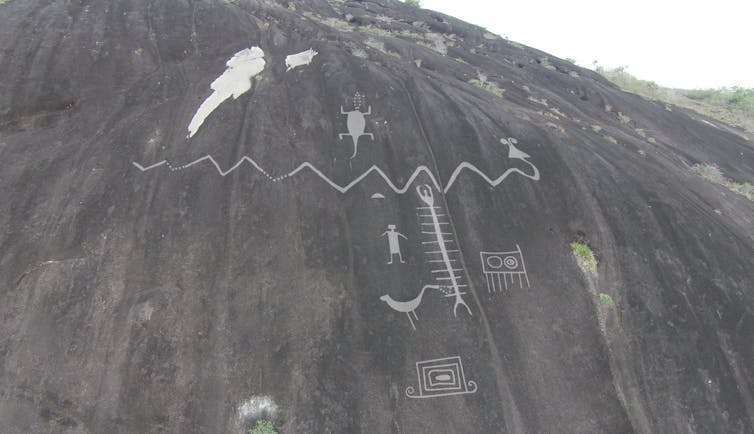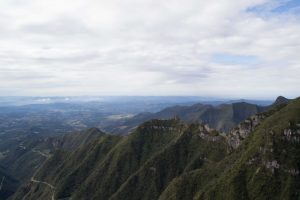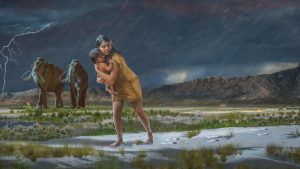Dr Philip Riris co-authors this article for The Conversation about his experiences documenting monumental rock art along the Orinoco River…
Documenting the world’s largest prehistoric rock art in South America – new study

Philip Riris, Author provided
Philip Riris, Bournemouth University; José R. Oliver, UCL, and Natalia Lozada Mendieta, Universidad de los Andes
We weren’t the first to lay eyes on the engraving since it was carved into the hillside any number of centuries or millennia ago, not by a long shot. The Venezuelan archaeologist José Maria Cruxent even recorded it in his diaries in the 1940s – and there were certainly visitors before him.
The site of Cerro Pintado (Painted Hill), in the Venezuelan state of Amazonas, is a local landmark and a well-known fixture on the itinerary of those travelling on the Middle Orinoco River.
Yet viewing the gigantic snake, carved high up on the hillside, immediately ignited both our sense of wonder and our scientific curiosity. Why a snake? Why did its creators climb a towering granite hill to place it there, just so? What about all the other engravings orbiting it – what do they mean?
All these questions and more swirled around our little group as we stood, sticky and mosquito-bitten, in the savanna at the foot of the hill. Its singular status made it all the more intriguing.
While there are other examples of giant prehistoric rock art in other parts of the world, these appear to be the largest. While, as mentioned, some were already known to archaeologists, our team documented others, including over the border in Colombia.
The results reveal a high concentration of these monumental engravings in the region. The subjects of these symbolic works include snakes, humans and centipedes. The animals probably played an important role in the mythologies of the people who made them. The results have been published in the journal Antiquity.
New sites to survey
On our visit to Cerro Pintado in 2015, we supposed that the enormous 42-metre-long snake engraving (probably representing a boa or anaconda, native to the region) stood in splendid isolation. Prior scholars observed that many rock shelters in the surrounding savanna hosted prehistoric paintings, and we had already seen plenty of engravings near our dig sites.
Although often numerous or quite large, none of these sites shared the truly monumental scale of the Cerro Pintado engravings. Its apparent uniqueness led us to dutifully return with a drone to secure better images of the highly inaccessible panel. Already during the first stint in the field, however, we suspected that there was more to be uncovered about the rock art of the region.
Our guide, Juan Carlos García, a local educator and photographer, was well travelled around the area, and had plenty of insights to share. While surveying the islands that separate the calm middle course of the Orinoco River from its turbulent upper reaches, he pointed to the Colombian bank and forthrightly informed us: “Do you see that hill? Over there, behind it, is another snake, as big as Pintado.”
The possibility of another snake was beyond tantalising to us. Did it also have a set of accompanying motifs? Was it truly as big and as visible from far away? For lack of scientific permits in Colombia, or the time to search for a new site even if we had permits, these questions were left unanswered. After four campaigns in Venezuela, our fieldwork funding ended in 2017 and Cerro Pintado remained, as far as archaeology was concerned, a one-and-only location.
Luckily, the project’s principal investigator, José Oliver, at the UCL Institute of Archaeology, secured the means to return to survey the Colombian side in 2018. The results of careful systematic surveys were shared between the team in a flurry of excited text messages and emails, confirming that there was not just one more snake, but several. They were also comparable in size to Pintado and clearly related, yet each with their own twist.
The project’s doctoral candidate, Natalia Lozada Mendieta, from the Universidad de Los Andes, Colombia, now an assistant professor, also returned in 2021 and 2022 to find more snakes. Finally, the entire original team reunited in the field in 2023. Collectively, and with help from local guides, we amassed a database of 13 vast rock art sites with upwards of 150 individual engravings between them.
Striking motifs
To us, the snakes were the most striking motifs, although giant centipedes, humans dancing or playing instruments, and mysterious geometric shapes of unknown intent did not fail to impress. Although not unique, as previously thought, Cerro Pintado is now accompanied by a constellation of related sites – a genuine monumental rock art tradition.
Very large prehistoric petroglyphs, the scientific term for rock engravings, are not unknown. Whales and elk are depicted in the Stone Age art of Norway, and virtually life-size giraffes and camels are known from Niger and Saudi Arabia, respectively.
Highly visible or salient rock art such as this is often presumed to communicate ideas or concepts of importance. While their exact meaning is lost, their impact can be felt through their physicality, meaning their size and placement.
In our cases, we are fortunate to note repeating themes across the indigenous cosmologies of northern South America that allude to gigantic snakes as the creators and protectors of rivers – including the great “river” in the sky, the Milky Way. Yet they are also menacing, predatory and lethal.
This information enriches our understanding of the archaeological record. The snakes were intended to be seen from some distance, reflecting a shared understanding of the world and its inhabitants. What marks the Middle Orinoco out as a unique hotspot, we argue, is the sheer concentration of these enormous works of pre-Columbian art.
They appear to be the largest in the world, and speak to a contested, yet openly communicative cultural landscape during the pre-Columbian period that we are only just beginning to understand.
More importantly, as regional tourism expands year on year, the sites are
increasingly in need of protection, an activity in which indigenous people should have a leading voice. Undoubtedly, there are dozens more sites in this unique monumental tradition to encounter, record and, hopefully, preserve.![]()
Philip Riris, Lecturer in Archaeological & Palaeoenvironmental Modelling, Bournemouth University; José R. Oliver, Reader in Latin American Archaeology, Institute of Archaeology, UCL, and Natalia Lozada Mendieta, Assistant Professor, Department of Art History, Universidad de los Andes
This article is republished from The Conversation under a Creative Commons license. Read the original article.
 Current research, being led by Dr Phil Riris, is
Current research, being led by Dr Phil Riris, is 
 Thursday 22 April at 4pm
Thursday 22 April at 4pm Thank you to those who attended the IMSET launch last week. We hope that you now have a better idea of who we are and what we are aiming to do.
Thank you to those who attended the IMSET launch last week. We hope that you now have a better idea of who we are and what we are aiming to do.










 Dr. Ashraf cited on ‘Modest Fashion’ in The Guardian
Dr. Ashraf cited on ‘Modest Fashion’ in The Guardian NIHR-funded research launches website
NIHR-funded research launches website Academics write for newspaper in Nepal
Academics write for newspaper in Nepal New paper published on disability in women & girls
New paper published on disability in women & girls MSCA Postdoctoral Fellowships 2025 Call
MSCA Postdoctoral Fellowships 2025 Call ERC Advanced Grant 2025 Webinar
ERC Advanced Grant 2025 Webinar Horizon Europe Work Programme 2025 Published
Horizon Europe Work Programme 2025 Published Horizon Europe 2025 Work Programme pre-Published
Horizon Europe 2025 Work Programme pre-Published Update on UKRO services
Update on UKRO services European research project exploring use of ‘virtual twins’ to better manage metabolic associated fatty liver disease
European research project exploring use of ‘virtual twins’ to better manage metabolic associated fatty liver disease